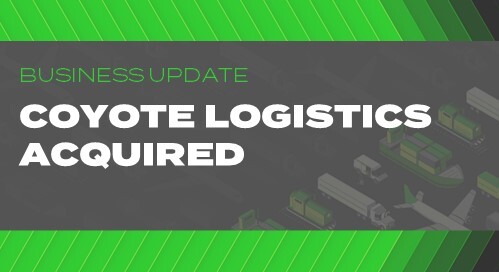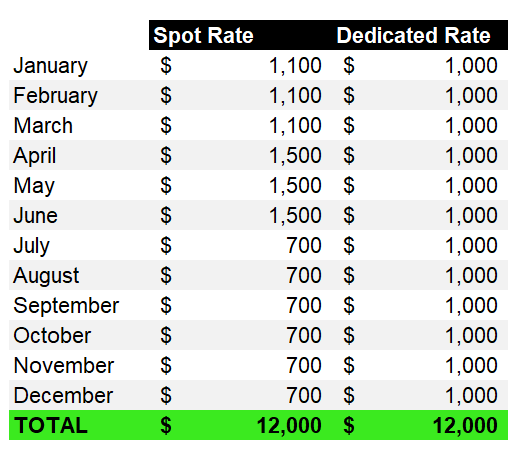Carrier’s Guide to Dedicated Freight: 6 Reasons Smaller Fleets Are Hauling It
According to research from over 300 trucking companies, keeping maintenance and operational costs down was their #1 overall challenge.
That’s no surprise — the truckload market is extremely volatile.
Every few quarters, it swings from tight carrier capacity and high rates, to a shipper’s market where freight and rate-per-mile increases are hard to come by.
But many trucking companies build a predictable, consistent revenue stream by relying on dedicated freight.
Dedicated freight can add stability and decrease hassle, and you don’t need 250 trucks to take advantage of it.
We’ll cover everything you need to know so you can decide if dedicated freight is right for your business.
What Is Dedicated Freight for Trucking Companies?
Dedicated freight is an arrangement between a carrier and a shipper (or broker), where the carrier agrees to haul consistent truckload shipments in the same lane at a fixed rate for a specified period of time.
Is is also called contract freight or primary freight, and is the opposite of spot freight.
With dedicated freight, the carrier commits a certain amount of driver capacity to the shipper, and usually has to meet minimum service requirements (on-time pickup, tender acceptance, etc.) to keep the lane.
Important note: dedicated freight is not the same as a dedicated fleet. Though there are similarities, any for-hire carrier can haul dedicated freight.
Dedicated Freight Is:
Consistent
There is usually at least one load per week in each shipping lane.
Long-Term
Agreements are typically annual, but shorter arrangements are possible.
Stable
Rates stay the same for the duration of the agreement (excluding fluctuations in fuel).
Based on Mutual Trust
The carrier commits a certain amount of driver capacity, and the shipper commits to a certain amount of freight.
Efficient
Opportunities are usually drop trailer, which reduces driver detention and increases scheduling flexibility.
Service-Oriented
Only reliable, high-performing carriers are able to win and maintain dedicated opportunities.
How Many Trucks Do I Need to Haul Dedicated Freight?
You do not need to be a large regional fleet to tap into the benefits of dedicated freight — many trucking companies with 50 trucks or less are doing it.
Though there is not set minimum, we find that carriers usually need at least 15 trucks in their fleet before they can handle dedicated opportunities.
Since most dedicated freight is drop trailer, carriers will often need more trailers than trucks — a 2:1 trailer-to-truck ratio is ideal.
For fleets smaller than 15 trucks and/or no excess trailers, it’s hard to manage drop pools or flex up and down with the shipper’s needs.
Dedicated Freight in Action
Sugar Creek Transportation uses dedicated freight to attract and retain drivers, and they’ve grown their fleet 13x while hauling dedicated freight.
How Do Small Fleets Access Dedicated Freight?
It can be difficult for smaller carriers to find, develop and manage relationships with shippers.
But you don’t need to have a sales team to win dedicated freight — working with a large, service-oriented broker or third-party logistics provider (3PL) like Coyote is a great way to access dedicated freight opportunities, especially from huge shippers.
By relying on a trusted 3PL, you can outsource all the sales and relationship management. You focus on managing your drivers, the 3PL take care of everything else.
Related: Learn How to Get Dedicated Freight with Coyote
Is Dedicated Freight Cheaper than Playing the Spot Market?
Every dedicated opportunity is different, but the answer usually depends on where we are in the truckload market cycle.
Generally speaking:
- If we are in an inflationary market (more freight than drivers, aka “carrier’s market”), spot freight often pays a higher rate-per-mile than dedicated freight.
- If we are in a deflationary market (more drivers than freight, aka “shipper’s market”), spot freight often pays a lower rate-per-mile than dedicated freight.
The key is to look at how much that dedicated lane will pay out over the long-term.
Understand that the market moves in cycles — whether times are good or bad, expect them to change.
Let’s look at an example:
You have a year-long agreement to haul one load a week from Chicago to Detroit for $1,000 per load.
When you made the agreement, the spot market rate was paying about $1,100, so you took a little bit of a price cut to get the guaranteed volume.
Four months in, the market rate shot up to $1,500, so you are effectively missing out on $500 a load.
Seven months in, the market turned and now it’s paying $700 a load, so your are getting paid $300 over market value, while other carriers can’t even find a load.
In this example, the year-long payout was even, but with dedicated, there was much less hassle and stress finding and negotiating rates.
Of course it doesn’t always work out like this — sometimes spot pays more, sometimes less — but it illustrates the point.
Dedicated freight is all about consistency. Sometimes you may get overpaid, sometimes you may get underpaid, but the key is you will always get paid.
Can I Make More Money Hauling Dedicated Freight?
Instead of thinking about dedicated freight in terms of money on a per-load or per-lane basis, take a step back and think about it as a strategic investment.
What kind of businesses do you want to build? Do you want to grow, or are you happy with where you’re at?
It can be hard to grow your fleet if you only ride the spot market wave.
To really expand your business, you will need a consistent, reliable source of revenue, network density and operational efficiency — dedicated freight will give you all of that.
Most strategic carriers diversify, mixing both spot and dedicated opportunities in their mix. That’s actually how we at Coyote run our business, using both support sustainable growth.
Dedicated Freight in Action:
See how Madan Logistics grew their fleet by 5x in under 2 years by moving dedicated freight with Coyote.
6 Reasons to Haul Dedicated Freight
There are a lot more benefits to hauling dedicated freight than just how much it pays. Here is an overview of what your fleet can get.
1. It makes life easier for your dispatchers.
Planning and dispatching drivers on dedicated freight is easy and efficient. By putting part of your fleet on dedicated lanes, it frees up your dispatchers to focus on finding the best rates on tougher backhauls, driver satisfaction, and getting reimbursed for accessorials.
2. It improves driver safety, satisfaction and efficiency.
By moving the same lanes on a weekly (or sometimes daily) basis, it can improve driver safety. As your drivers get familiar with the route, the facilities and the staff, they may be less prone to accidents and more efficient.
With consistent volume, drivers will also know when they’ll be home spending time with their families.
Furthermore, most dedicated opportunities are drop trailer. Not only does this reduce time at facilities, it creates a flexible schedule for driver planning.
The driver shortage is an issue, so anything you can do to keep the ones you have is a smart move.
3. No more fighting over freight.
Ever wanted to book a posted load, only to find out it went to another carrier first? With dedicated freight, the tender goes right to you. No more missing out on the freight you need.
4. You’ll keep your trucks loaded, rolling and paid.
You know when your trucks will be moving and how much revenue you will bring in, week after week, on your dedicated lanes. In a volatile industry, this is money your business can count on.
5. You can access new opportunities.
If you are a small or mid-sized fleet, you may not have the resources to get customer freight, especially from large shippers.
By working with a large 3PL like Coyote, you can tap into an ocean of freight that never hits our load board.
6. It positions your business for long-term success.
The most successful carriers know that you have to think past your next load to expand your fleet. With some of your trucks dedicated to consistent freight, you can focus your valuable time on managing the rest of your business.
Want Access to Coyote Freight that Never Hits the Open Board?
You know that dedicated lanes can be a huge growth opportunity for your business, but how can you get some for yourself?
As a network carrier for Coyote, we give you multiple ways to dedicate your trucks. We have a team that studies your network to find the right opportunities for your business.
If you’re ready to get started, hit the button below and fill out the form.
If you want to learn a little more about what Coyote has to offer first, check out this guide to getting dedicated freight with Coyote.






